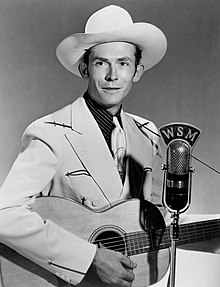Hank Williams Sr
| Hank Williams | |
|---|---|

Hank Williams in a publicity photograph for WSM in 1951
|
|
| Born |
Hiram Williams September 17, 1923 Mount Olive, Butler County, Alabama, U.S. |
| Died | January 1, 1953 (aged 29) Oak Hill, West Virginia, U.S. |
| Cause of death | Heart failure brought about by alcoholism and prescription drug abuse |
| Resting place | Oakwood Annex Cemetery Montgomery, Alabama, U.S. 32°23′05″N 86°17′29″W / 32.3847°N 86.2913°W |
| Other names |
|
| Occupation | Singer-songwriter |
| Spouse(s) | Audrey Sheppard (m. 1944; div. 1952) |
| Children |
Hank Williams, Jr. Jett Williams |
| Relatives |
Hank Williams III (grandson) Holly Williams (granddaughter) Sam Williams (grandson) |
| Website | www |
| Musical career | |
| Genres | |
| Instruments |
|
| Years active | 1937–1952 |
| Labels | |
| Associated acts | |
| Signature | |
Hiram "Hank" Williams (September 17, 1923 – January 1, 1953) was an American singer-songwriter. Regarded as one of the most significant and influential American singers and songwriters of the 20th century, Williams recorded 35 singles (five released posthumously) that reached the Top 10 of the Billboard Country & Western Best Sellers chart, including 11 that ranked number one (three posthumously).
Born in Mount Olive, Butler County, Alabama, Williams relocated to Georgiana with his family, where he met Rufus Payne, who gave him guitar lessons in exchange for meals or money. Payne had a major influence on Williams' later musical style, along with Roy Acuff and Ernest Tubb. He would later relocate to Montgomery, where he began his music career in 1937, when producers at radio station WSFA hired him to perform and host a 15-minute program. He formed the Drifting Cowboys backup band, which was managed by his mother, and dropped out of school to devote his time to his career.
When several of his band members were conscripted into military service during World War II, Williams had trouble with their replacements, and WSFA terminated his contract because of his alcohol abuse. Williams eventually married Audrey Sheppard, who was his manager for nearly a decade. After recording "Never Again" and "Honky Tonkin'" with Sterling Records, he signed a contract with MGM Records. In 1947 he released "Move It on Over", which became a hit, and also joined the Louisiana Hayride radio program.
One year later, he released a cover of "Lovesick Blues" recorded at Herzog Studio in Cincinnati, which carried him into the mainstream of music. After an initial rejection, Williams joined the Grand Ole Opry. He was unable to read or notate music to any significant degree. Among the hits he wrote were "Your Cheatin' Heart", "Hey, Good Lookin'", and "I'm So Lonesome I Could Cry".
...
Wikipedia
